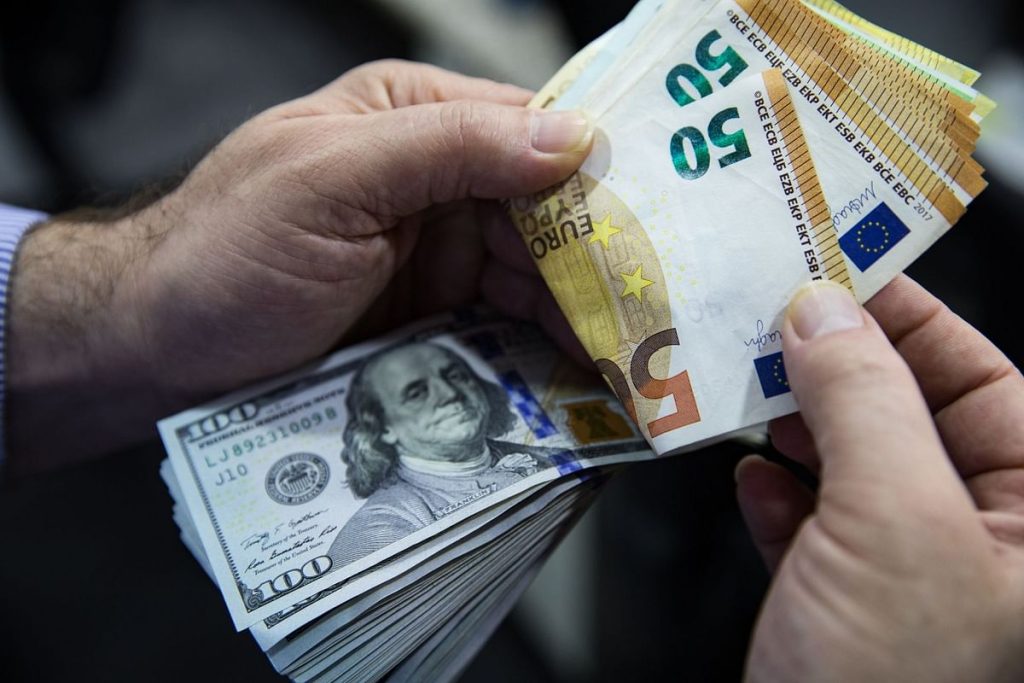(Bloomberg Opinion) — The euro’s weakness is fast becoming a problem for the European Central Bank as its decline drives it below parity to the dollar. While that threshold may just be a number, it is undeniably more than symbolic: Its breach will affect confidence in the euro zone and, for once, is driven as much by concern about Europe’s economic outlook as it is by investors seeking the haven of the greenback. The central bank needs to respond with a bigger-than-planned rate increase later this month.
The clear and present danger of Russia cutting off energy supplies and the economic turmoil that would ensue, shutting down industry and prompting widespread power rationing, is leading to an exodus of investors from the common currency. Kit Juckes, chief currency analyst at Societe Generale SA, reckons the euro is “unbuyable,” seeing potential for it to drop as low as 90 cents to the dollar in the not-too-distant future. Contrary to what happened during the past decade, a weaker euro this time will hurt the economy. Rather than the current bout of currency cheapening producing an export boom, it is instead importing yet more inflation. Note, though, that this is not an existential crisis about the structure of the euro, as the bloc’s member nations are all in this dilemma together.
The currency’s drop ought to persuade the ECB to raise official borrowing costs faster than it is currently anticipating, narrowing the interest-rate differential to other major global currencies. The Federal Reserve has raised rates by 150 basis points this year and is poised for much more tightening; more than 50 countries have raised official rates this year by at least 50 basis points. The ECB has yet to act, with its official deposit rate still negative, making it very late to the tightening party — what could turn out to have been a serious policy mistake. The euro is weaker this month versus all of the world’s major currencies.
Up to now, despite the ECB not officially targeting the euro, the governing council has relied on expressing concern and comments that it is “monitoring” currency levels. Unsurprisingly, this verbal intervention has a very limited effect on the foreign-exchange market. While buying euros using reserves is a last resort (and magnified if coordinated with other central banks), there is a precedent of official currency purchases in late 2000 when the euro was around 85 cents to the dollar. Raising interest rates should be the first line of defense, hopefully buoying the currency well before the point at which market intervention is required.
ECB President Christine Lagarde has been highly prescriptive in telegraphing that policy makers will kick off with their first rate hike in a decade at their next meeting on July 21, but only by 25 basis points. A further increase is set to follow in September, finally ending eight years of negative rates. But that pace might too be slow to avoid a hot summer of currency weakness before a cold winter of prospective energy shortages.
French Foreign Minister Bruno Le Maire said in a speech on Sunday that it is “likely” that Russia will totally shut off gas supplies to Europe. The ECB needs to take action to defend the euro, since the economy will only get weaker and the downturn will be magnified by a concomitant currency crisis. Policy makers need to crank the official deposit rate up by 50 basis points to zero on July 21, and chart a path for borrowing costs to continue to head higher into positive territory in the coming months. There is no time to waste.
More From Bloomberg Opinion:
This column does not necessarily reflect the opinion of the editorial board or Bloomberg LP and its owners.
Marcus Ashworth is a Bloomberg Opinion columnist covering European markets. Previously, he was chief markets strategist for Haitong Securities in London.
